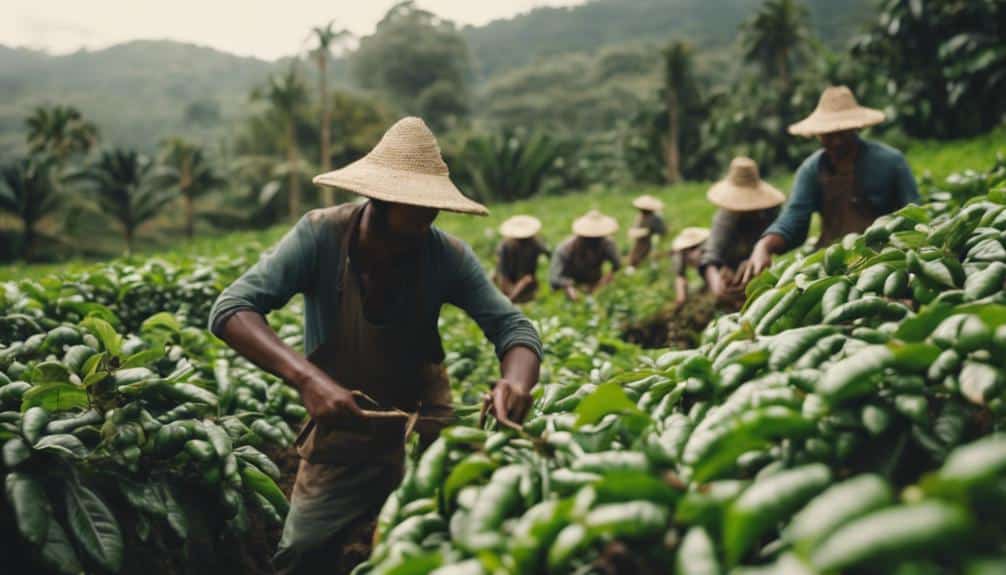The Uniqueness of Dung Coffee Beans

As I explored the world of gourmet coffee, one particular variety caught my attention for its truly unique nature. The intriguing process through which dung coffee beans are crafted offers a glimpse into a domain of flavors rarely experienced in the domain of coffee. The blend of earthiness, nuttiness, and a hint of spice creates a sensory journey that is both unexpected and delightful. The allure of these beans goes beyond their unconventional origin, enticing those with a taste for the extraordinary to discover what makes them truly stand out in the sphere of specialty coffees.
Origins of Dung Coffee Beans
Originating from Thailand's Golden Triangle region, dung coffee beans are a unique specialty renowned for their distinctive flavors resulting from a meticulous fermentation process within the digestive system of elephants at a sanctuary. The Arabica beans used in this process are carefully sourced and fed to the elephants. Once ingested, the natural fermentation process begins as the beans pass through the elephants' digestion system. The handling of these beans is vital to maintain the quality and taste desired in dung coffee.
Thailand's Golden Triangle provides an ideal environment for growing Arabica beans, which are essential for the production of dung coffee. The elephants' digestive enzymes play a significant role in breaking down the proteins and carbohydrates present in the beans, affecting the final flavor profile. This digestion process is what sets dung coffee apart from other varieties, creating a unique taste that coffee connoisseurs seek. The careful sourcing and handling of the beans ensure that the fermentation process occurs optimally, resulting in the high-quality dung coffee appreciated by many.
Unique Flavor Profile Development
Through the fermentation process inside the elephants' stomachs, the flavor profile of dung coffee undergoes a unique evolution.
The breakdown of bitter proteins results in a smooth, non-bitter cup of coffee with distinctive notes of chocolate, malt, spice, and a hint of grass.
This aroma enhancement technique creates a coffee experience that stands out due to its lack of bitterness and soft tea-like texture, appealing even to those who aren't coffee connoisseurs.
Flavor Evolution Process
During the unique flavor evolution process of dung coffee beans, the natural fermentation in elephants' stomachs plays an essential role in developing the exclusive taste profiles sought after by coffee connoisseurs.
- The fermentation process in the elephant's digestive system breaks down bitter proteins in the beans, resulting in a milder and more complex flavor profile.
- This natural fermentation imparts earthy and nutty notes to the coffee, setting it apart from other specialty coffees.
- The slow digestion of the beans by the elephants allows for a gradual development of flavors, enhancing the richness and depth of the final brew.
- The flavor evolution in dung coffee beans leads to a distinctive taste profile with hints of chocolate, malt, spice, and a touch of grass, creating a truly unique and sought-after coffee experience.
Aroma Enhancement Techniques
In understanding the development of the unique flavor profile of Black Ivory Coffee, the utilization of aroma enhancement techniques involving the natural fermentation process in elephants' stomachs is an essential factor. The fermentation process within the elephants' digestive system plays a vital role in breaking down proteins and creating an exclusive flavor profile.
This process imparts rich chocolate notes, subtle malt notes, and delicate spice notes to the coffee beans, resulting in a distinctive flavor that captivates coffee enthusiasts. Unlike conventional methods, Black Ivory Coffee's aroma enhancement techniques harness the elephants' digestive capabilities to produce a one-of-a-kind coffee experience.
The exclusive flavor profile achieved through these innovative techniques offers a memorable and unparalleled taste adventure for those seeking unique and complex coffee flavors.
Enzymatic Treatment in Digestive System

The enzymatic breakdown of proteins by the elephant's digestive system plays a critical role in reducing the bitterness of coffee beans, thereby enhancing the final flavor profile of dung coffee.
Enzymes in the digestive system break down proteins into smaller compounds, reducing the harsh and bitter notes commonly found in raw coffee beans.
The slow fermentation process in the elephant's stomach allows for a gradual breakdown of proteins, sugars, and fats, leading to a more complex and balanced flavor profile.
Natural fermentation in the digestive system imparts earthy and nutty flavors to the coffee, creating a unique sensory experience for coffee enthusiasts.
The enzymatic treatment in the digestive system results in a distinctive taste that sets dung coffee apart, providing consumers with a beverage that showcases smooth characteristics and rich undertones.
Through this natural enzymatic process, dung coffee acquires its signature taste, making it a sought-after delicacy known for its exceptional flavors and distinctive qualities.
Rare and Complex Taste Creation
When delving into the rare and complex taste creation of elephant dung coffee, it's crucial to grasp the intricate flavor profiles that emerge from the fermentation process.
These flavors, which span from chocolatey notes to hints of spice and malt, highlight the unique influence of the elephants' digestive system on the coffee beans.
Exploring the brewing techniques that enhance these flavors can lead to a deeper appreciation for the exclusive and luxurious tasting experience that elephant dung coffee offers to enthusiasts.
Flavor Profiles Explained
Utilizing a specialized fermentation process within the digestive system of elephants, the creation of Black Ivory Coffee results in a rare and complex flavor profile unlike any traditional coffee.
- The unique taste of Black Ivory Coffee is a result of the fermentation process in the elephants' digestive system, which imparts distinct flavors of chocolate, malt, spice, and a hint of grass.
- These complex flavors create a coffee experience that stands out for its richness and depth, appealing even to those not well-versed in coffee tasting.
- The lack of bitterness in elephant dung coffee, coupled with its soft tea-like texture, provides a truly exceptional sensory journey for coffee enthusiasts.
- The natural fermentation of coffee beans in the elephants' stomachs produces floral and chocolate aromas, a chocolate malt taste, and subtle hints of cherry, elevating the coffee's flavor profile to a luxurious level.
Brewing Techniques Revealed
In the process of brewing dung coffee, the unique fermentation of coffee beans in elephants' stomachs is central to creating the rare and complex flavors that define this extraordinary beverage.
The meticulous sourcing of Arabica beans from northern Thailand guarantees a high-quality experience. After collection from dung, the beans undergo meticulous processing to maintain their exclusive nature.
The fermentation process that occurs in the elephants' guts during the coffee bean digestion contributes greatly to the distinctive taste and lack of bitterness in dung coffee.
This exclusive coffee boasts complex characteristics with floral and chocolate aromas, a soft tea-like texture, and subtle hints of cherry, malt, and spice.
The careful brewing techniques employed in dung coffee production result in a truly exceptional and unparalleled coffee experience.
Sought-After Delicacy Characteristics

An essential trait of sought-after delicacy characteristics in dung coffee beans is their unparalleled earthy flavor profile resulting from the unique fermentation process in elephants' stomachs.
- The slow fermentation process in elephants' stomachs enhances the flavors of the coffee beans, creating a distinctive taste that sets dung coffee beans apart from other varieties.
- Black Ivory Coffee, one of the world's most expensive coffees, commands a price of $1,100 per kilogram due to its rarity and the intricate production process involving elephants.
- The fermentation process in elephants' stomachs not only reduces bitterness in the coffee beans but also contributes to a smooth and rich flavor that appeals to connoisseurs.
- By supporting elephant welfare and conservation efforts, the production of dung coffee beans plays an essential role in maintaining a sustainable ecosystem where elephants thrive alongside coffee cultivation.
Ethical Production Process Insights
Through a meticulous process of feeding coffee beans to elephants for natural fermentation, the unique and ethical production of elephant dung coffee unfolds. This process is a harmonious blend of luxury and environmental responsibility, showcasing a commitment to elephant conservation in Thailand. The elephant dung coffee production begins with carefully collected beans from elephant feces, which are then washed, sun-dried, and expertly roasted in Bangkok to bring out their distinct flavors. This unique process not only guarantees the highest quality coffee but also supports the well-being of the elephants involved.
The ethical production of elephant dung coffee goes beyond just the final product; it encompasses a deep-rooted sense of environmental stewardship and community support. By monitoring the elephants' welfare throughout the process, producers uphold stringent ethical standards to safeguard that no harm comes to these magnificent creatures. This commitment to ethical sourcing sets elephant dung coffee apart as a truly exceptional and socially responsible luxury product that embodies the values of sustainability and conservation.
Environmental and Social Impact

The production of elephant dung coffee not only showcases a unique process of natural fermentation but also highlights its significant environmental and social impacts through supporting elephant conservation and community livelihood.
- Elephant Conservation: Black Ivory Coffee actively contributes to elephant conservation efforts by donating proceeds to the Golden Triangle Asian Elephant Foundation, promoting the welfare of these majestic animals.
- Community Livelihood: The production of elephant dung coffee provides a source of income for local communities involved in the collection and processing of the beans, fostering economic stability and sustainable livelihoods.
- Unique Flavors: The natural fermentation process that the coffee beans undergo in the elephant's digestive system imparts distinctive and sought-after flavors, appealing to coffee enthusiasts looking for novel taste experiences.
- Environmental Responsibility: By engaging in ethical sourcing practices and promoting environmental responsibility, elephant dung coffee sets a precedent for the coexistence of luxury products with social responsibility, exemplifying a harmonious blend of indulgence and sustainability.
Growing Popularity and Market Demand
The surging demand for elephant dung coffee, driven by its unique flavor profile and ethical production practices, is shaping a distinct trend in the luxury coffee market. Consumers are increasingly drawn to the exclusive taste experience offered by Black Ivory Coffee, which stands out in a market saturated with traditional coffee varieties.
The limited availability of dung coffee beans adds to its allure, making it a sought-after commodity among coffee connoisseurs. The unique production methods employed in creating elephant dung coffee, coupled with sustainability initiatives, resonate with a niche audience seeking more than just a caffeine fix.
This growing market demand for unconventional and socially responsible coffee choices reflects a shift towards valuing innovation and ethical practices in the coffee industry. As more consumers embrace the idea of novel coffee experiences, the appeal of elephant dung coffee continues to rise, establishing itself as a premium product in the market.
Conclusion
To sum up, dung coffee beans offer a truly unique and exclusive tasting experience, with flavors ranging from earthy to nutty notes.
The enzymatic treatment in the elephants' digestive system results in a rare and complex taste profile that appeals to coffee enthusiasts seeking something extraordinary.
The ethical production methods and environmental responsibility involved in their creation further enhance their appeal in the market, making dung coffee beans a sought-after delicacy with growing popularity and demand.





